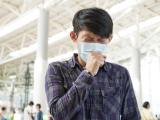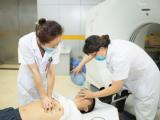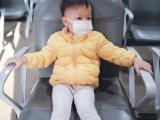Mar 28, 2003 (CIDRAP News) – Global cases of severe acute respiratory syndrome (SARS) have continued to climb rapidly in recent days, reaching 1,485 today, as the World Health Organization (WHO) and various cities and countries stepped up efforts to contain the disease.
WHO reported 53 deaths from the mysterious disease as of today. Today's global case count of 1,485 was up from 1,323 reported Mar 26. In Hong Kong, the center of the outbreak, authorities reported 425 cases today, including 58 new cases, with 45 patients in intensive care. The Centers for Disease Control and Prevention (CDC) yesterday reported 51 US cases—an increase of 11 in 2 days—but no deaths.
Yesterday WHO officials recommended screening to prevent infected people from boarding planes leaving the hardest-hit areas, including Hong Kong, Shanxi, and Beijing, China; Singapore; Taiwan; Hanoi, Vietnam; and Toronto. Hong Kong officials closed schools for 9 days and required all arriving travelers to fill out health forms. Schools also were closed in Singapore.
In Toronto, health authorities may screen all passengers leaving the main airport, and they have asked people who may have been exposed to SARS to stay home and wear masks when meeting other people, according to a Reuters report.
In its screening recommendation, WHO recommended that health officials question passengers about any symptoms that could suggest SARS. Most cases have resulted from close contact with SARS patients, and "close face-to-face contact could conceivably occur in an aircraft among persons seated close to a person infected with SARS and coughing or sneezing," a WHO statement said. But the agency said asymptomatic contacts of SARS patients should be allowed to travel.
At a briefing yesterday, CDC officials said the 51 US patients included 44 who had traveled to areas affected by the outbreak, five who were family members of others who traveled, and two healthcare workers who had cared for SARS patients.
James Hughes, head of the National Center for Infectious Diseases, said 14 of the 51 patients have had pneumonia, but only one required ventilatory support. "We're extremely pleased that there have not been any deaths," he said, adding, "We're seeing milder illness overall than people in Asia." He attributed the zero death toll to early recognition of the illness, good clinical management, and good infection control practices.
In today's issue of Morbidity and Mortality Weekly Report, CDC says the transmission mechanism for SARS is still unclear, but "droplet and contact transmission appear to be the predominant modes." The report describes how 13 people who stayed at a Hong Kong hotel (identified in news reports as the Metropole) in February apparently spread the disease to four Hong Kong hospitals and to Vietnam, Singapore, Ireland, Canada, Germany, and the United States. The illness was originally brought to the hotel by a visitor from China's Guangdong Province, the report says.
"The cases in the hotel M [Metropole] cluster and certain hospital clusters involving seriously ill patients suggest airborne or fomite transmission," the report states. "Therefore, infection-control recommendations should include precautions to prevent airborne, droplet, and contact transmission."
At yesterday's briefing, the CDC's John Jernigan said CDC had issued new infection control guidance to hospitals the previous night. "We have no reason to believe that people can transmit this disease when they don't have symptoms," he said. He said healthcare workers caring for SARS patients should be monitored carefully for possible symptoms.
WHO and CDC both reported growing evidence that SARS is caused by a new member of the Coronavirus family, previously associated chiefly with the common cold. "Data from many network laboratories indicate that a coronavirus is the primary cause of the disease," said WHO virologist and epidemiologist Klaus Stohr in a statement yesterday. "It is consistently found in specimens from SARS patients from many countries. It has been isolated in cell culture. We are very close to knowing for sure."
WHO officials also said three laboratories in Hong Kong have developed a "basic diagnostic test" using polymerase chain reaction technology. In a statement yesterday, officials said the test has been consistently positive in confirmed SARS patients and consistently negative in healthy controls.
See also:
WHO SARS page
http://www.who.int/csr/sars/en/
MMWR report on SARS
http://www.cdc.gov/mmwr/preview/mmwrhtml/mm5212a1.htm
Transcript of CDC's Mar 27 briefing
http://www.cdc.gov/media/transcripts/t030327.htm




















